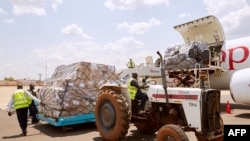Much publicized COVID-19 supplies donated by Chinese billionaire Jack Ma and his Alibaba Group never made it to Eritrea, despite Ethiopian Prime Minister Abiy Ahmed's saying the supplies had been delivered to the entire continent.
The reasons why the goods did not reach Eritrea are unclear, but rights activists accuse the government of ignoring the needs of its people.
Two officials at the Africa Centers for Disease Control and Prevention, which helped organize delivery of the coronavirus masks and test kits to various African countries, confirmed to VOA that no supplies reached Eritrea.
A senior Africa CDC official, who spoke on the condition of anonymity because he was not authorized to speak publicly about the matter, said the plane carrying the supplies was supposed to fly from Sudan’s capital to Asmara on March 23, but Eritrean officials never authorized the plane to land.
Forced to bypass Eritrea, the pilots instead flew to Djibouti and Kenya before returning to their starting point, Addis Ababa, he said.
James Ayodele, a spokesperson for the Africa CDC, said “the issue is still being discussed at a diplomatic level.”
Dr. Ahmed Ogwell, deputy director of the Africa CDC, told VOA that his organization is not privy to how flight paths and landing rights are secured and and that its role in the aid distribution is only technical.
“Africa CDC has been providing technical assistance in the distribution of the donations from the Prime Minister Abiy-Jack Ma Foundation Initiative to reverse COVID-19 from Africa and to date 50 countries in Africa had received their consignments. The Ethiopian Airlines continues to plan for distribution of the remaining countries despite the lockdowns instituted by governments in Africa to combat COVID-19,” he said.
Threat to health
Whatever the reason for Eritrea’s failure to accept the medical supplies, Meron Estefanos, executive director of the Eritrean Initiative on Refugee Rights, said the government is severely jeopardizing the health of its own citizens.
“I don’t believe that it was incompetence. I believe it’s just that they don’t care. If it was just because of bureaucracy, they would have just fixed the airline and they would have had it the next day. This is a country that can do lots of things. Importing something from Ethiopia to Asmara is a one-hour flight. They could even allow them to land right now, you get the point, just for medical purposes,” Meron said.
Health experts and human rights activists are gravely concerned that Eritrea is severely underequipped in the event of a severe coronavirus outbreak. The government has confirmed 18 COVID-19 cases to date.
Meron said that rather than accepting goods from abroad, the government is asking its diaspora across the globe to give money to the government.
”Eritrea is not ready for anything. First of all, just eight months ago they shut down 29 Catholic clinics. These were the best clinics in the country, giving free service to the public. But because of the Catholics' call for peace [and the] release of political prisoners, they shut down the clinics. But who is getting hurt? It’s the people," Meron said.
Talks continuing
Asked to comment on the matter, Billene Seyoum, a spokesperson for Ahmed, said only that talks were ongoing to resolve the issue. The Alibaba Foundation declined to comment.
Daniela Kravetz, the U.N. special rapporteur on human rights in Eritrea, said she did not want to specifically address the matter of Jack Ma’s supplies as she did not have firsthand information.
She did underline the dire need for medical supplies in Eritrea and the need to open the door to humanitarian aid.
“I am concerned about the fact that, if this continues to escalate, the reality is that many Eritreans will not be able to seek or obtain medical help. There is a lack of functioning intensive care units with adequate ventilators, shortage of water, shortage of medical staff, shortage of labs to carry out tests. I don’t really think the country has the medical capacity to deal with a pandemic like this one,” Kravets said.
She also called on Eritrea to release political prisoners and low-risk offenders because of the risk of COVID-19 spreading inside the country’s overcrowded prison system.




